冠词用法讲解
- 格式:doc
- 大小:32.00 KB
- 文档页数:8
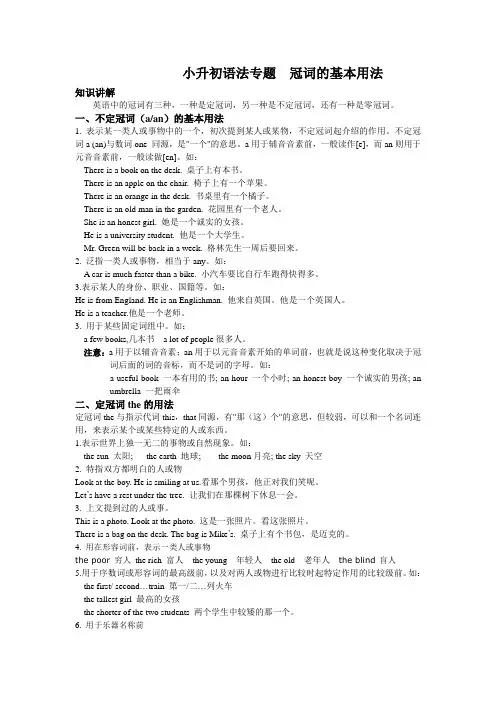
小升初语法专题冠词的基本用法知识讲解英语中的冠词有三种,一种是定冠词,另一种是不定冠词,还有一种是零冠词。
一、不定冠词(a/an)的基本用法1. 表示某一类人或事物中的一个,初次提到某人或某物,不定冠词起介绍的作用。
不定冠词a (an)与数词one 同源,是"一个"的意思。
a用于辅音音素前,一般读作[e],而an则用于元音音素前,一般读做[en]。
如:There is a book on the desk. 桌子上有本书。
There is an apple on the chair. 椅子上有一个苹果。
There is an orange in the desk. 书桌里有一个橘子。
There is an old man in the garden. 花园里有一个老人。
She is an honest girl. 她是一个诚实的女孩。
He is a university student. 他是一个大学生。
Mr. Green will be back in a week. 格林先生一周后要回来。
2. 泛指一类人或事物,相当于any。
如:A car is much faster than a bike. 小汽车要比自行车跑得快得多。
3.表示某人的身份、职业、国籍等。
如:He is from England. He is an Englishman. 他来自英国。
他是一个英国人。
He is a teacher.他是一个老师。
3. 用于某些固定词组中。
如:a few books,几本书 a lot of people很多人。
注意:a用于以辅音音素;an用于以元音音素开始的单词前,也就是说这种变化取决于冠词后面的词的音标,而不是词的字母。
如:a useful book 一本有用的书; an hour 一个小时; an honest boy 一个诚实的男孩; anumbrella 一把雨伞二、定冠词the的用法定冠词the与指示代词this,that同源,有"那(这)个"的意思,但较弱,可以和一个名词连用,来表示某个或某些特定的人或东西。
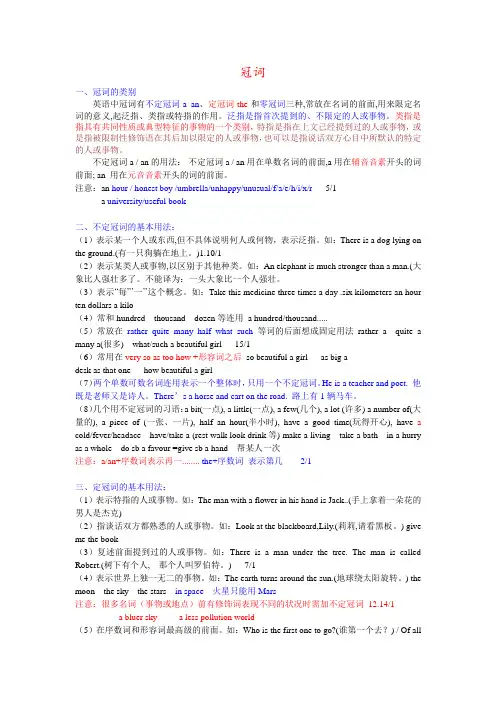
冠词一、冠词的类别英语中冠词有不定冠词a an、定冠词the和零冠词三种,常放在名词的前面,用来限定名词的意义,起泛指、类指或特指的作用。
泛指是指首次提到的、不限定的人或事物。
类指是指具有共同性质或典型特征的事物的一个类别,特指是指在上文已经提到过的人或事物,或是指被限制性修饰语在其后加以限定的人或事物,也可以是指说话双方心目中所默认的特定的人或事物。
不定冠词a / an的用法:不定冠词a / an用在单数名词的前面,a用在辅音音素开头的词前面; an 用在元音音素开头的词的前面。
注意:an hour / honest boy /umbrella/unhappy/unusual/f/a/e/h/i/x/r 5/1a university/useful book二、不定冠词的基本用法:(1)表示某一个人或东西,但不具体说明何人或何物,表示泛指。
如:There is a dog lying on the ground.(有一只狗躺在地上。
)1.10/1(2)表示某类人或事物,以区别于其他种类。
如:An elephant is much stronger than a man.(大象比人强壮多了。
不能译为:一头大象比一个人强壮。
(3)表示“每”’一’’这个概念。
如:Take this medicine three times a day .six kilometers an hour ten dollars a kilo(4)常和hundred thousand dozen等连用a hundred/thousand.....(5)常放在rather quite many half what such 等词的后面想成固定用法rather a quite a many a(很多) what/such a beautiful girl 15/1(6)常用在very so as too how +形容词之后so beautiful a girl as big adesk as that one how beautiful a girl(7)两个单数可数名词连用表示一个整体时,只用一个不定冠词。

初中英语语法冠词 Prepared on 24 November 2020初中英语语法讲解——冠词一、冠词的概念冠词是一个虚词,它置于名词之前,限定名词的意义.冠词可分为定冠词,不定冠词和零冠词三类.二、不定冠词:a/an用于辅音发音开头的词前,而不是辅音字母前面, 如:a book, a desk; 有些单词虽然是以元音字母开头,但需用a修饰,这些单词可以连成一句话:In a university, a European united a one-eyed man to steal a useful thing, then ran away along a one-way road. This is a usual thing.在一所大学里,一个欧洲人联合独眼龙偷了一件有用的东西,然后沿着一条单行道逃跑了。
这是一件平常的事。
用于元音发音开头的词前,而不是元音字母前,如:an apple, an hour.有些单词虽然是以辅音字母开头,但发音却是以元音开头,这些单词可以连成一句话:An hour ago, an honest man accepted an honorable task.一个小时以前,一个诚实人接受了一项光荣的任务。
a/an的用法:1. a/an 用于单数可数名词前,表示“某一”“一…”或者“一个”的意思.a book a boy a man a bird a dog an houran interesting book a big dog a dangerous animal2.表示类别:这种用法是指某人或某物属于某一种类,或者指某一种类的人或物中的任何一个或一件,或者指某一种类的人或物,但不具体说明是何人或何物。
例如:That is a pen, not a pencil.那是钢笔而不是铅笔。
(指属于某一种类)Give him a pear, please!请给他一个梨。
(指某一种类中的任何一个)An elephant is bigger than a horse. 大象比马大。
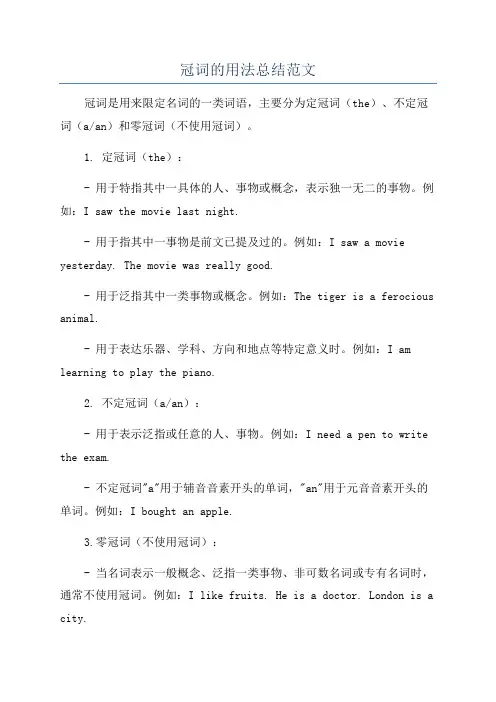
冠词的用法总结范文冠词是用来限定名词的一类词语,主要分为定冠词(the)、不定冠词(a/an)和零冠词(不使用冠词)。
1. 定冠词(the):- 用于特指其中一具体的人、事物或概念,表示独一无二的事物。
例如:I saw the movie last night.- 用于指其中一事物是前文已提及过的。
例如:I saw a movie yesterday. The movie was really good.- 用于泛指其中一类事物或概念。
例如:The tiger is a ferocious animal.- 用于表达乐器、学科、方向和地点等特定意义时。
例如:I am learning to play the piano.2. 不定冠词(a/an):- 用于表示泛指或任意的人、事物。
例如:I need a pen to write the exam.- 不定冠词"a"用于辅音音素开头的单词,"an"用于元音音素开头的单词。
例如:I bought an apple.3.零冠词(不使用冠词):- 当名词表示一般概念、泛指一类事物、非可数名词或专有名词时,通常不使用冠词。
例如:I like fruits. He is a doctor. London is a city.除了上述的用法外,冠词还有一些特殊用法,如:- 在表示乐器、学科、方向和地点等特定意义时使用定冠词(the)。
- 在表示序数词或最高级形容词时使用定冠词(the)。
- 在表示国家、地区、河流、山脉和海洋时使用定冠词(the)。
-在表示固定短语或习语中使用固定的冠词形式。
需要注意的是,冠词的使用在不同语言和不同语境中可能存在差异,需要根据具体语言的规则和语境来确定使用哪种冠词。
此外,冠词的正确使用也需要根据名词的单复数、可数性和语法功能等因素进行判断。
所以,学习和掌握冠词的用法需要通过大量的阅读和实践来提高。
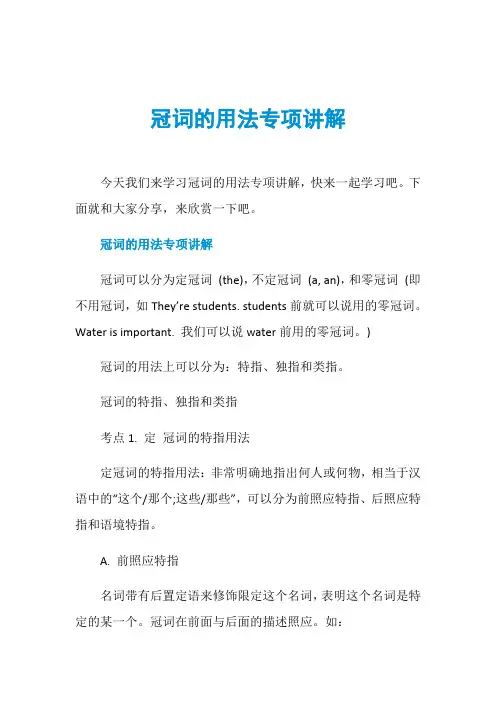
冠词的用法专项讲解今天我们来学习冠词的用法专项讲解,快来一起学习吧。
下面就和大家分享,来欣赏一下吧。
冠词的用法专项讲解冠词可以分为定冠词(the),不定冠词(a, an),和零冠词(即不用冠词,如They’re students. students前就可以说用的零冠词。
Water is important. 我们可以说water前用的零冠词。
) 冠词的用法上可以分为:特指、独指和类指。
冠词的特指、独指和类指考点1. 定冠词的特指用法定冠词的特指用法:非常明确地指出何人或何物,相当于汉语中的“这个/那个;这些/那些”,可以分为前照应特指、后照应特指和语境特指。
A. 前照应特指名词带有后置定语来修饰限定这个名词,表明这个名词是特定的某一个。
冠词在前面与后面的描述照应。
如:This is the bookyou lent me yesterday .这就是你昨天借给我的那本书。
This is the boyfrom England .这就是来自英国的那个男孩。
A. 后照应特指第一次提到某物某人时用不定冠词,再次提到该人该物时用定冠词。
冠词在后面与前面相照应。
如:I boughta book yesterday. The book cost me 20 yuan.A. 语境特指不是建立在上下文的照应关系上,而是建立在谈话双方共有的知识上。
如:Openthe door . 把门打开。
Where isthe book ?那本书在哪里?独指:指世上独一无二的事定冠词的独指用法:世界上独一无二的事物前,要用定冠词。
如:the sun, the moon, the earth, the world, the sky, the universe , etc.类指A. 可数名词表示类指时,有三种情况A horse is a domestic([d??mestIk]家养的)animal.= The horse is a domestic animal.= Horses are domestic animals.但是这三种类指方法各有侧重:the指的是整个类别,这个类别是可以区别于另一个类别的(多用于谈论发明物和科技问题)。
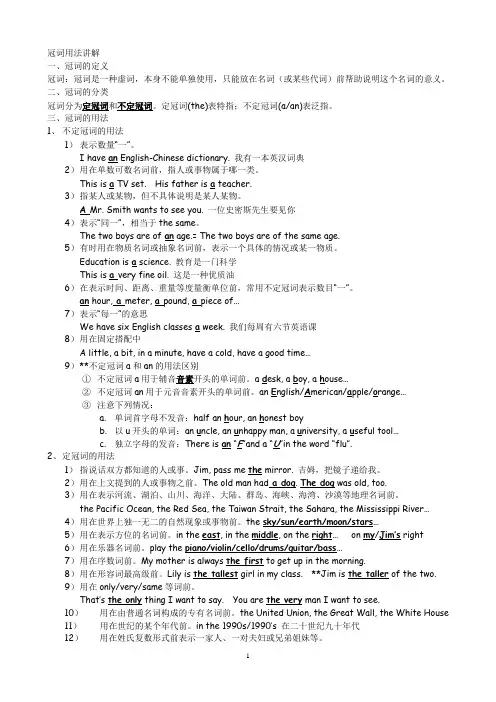
冠词用法讲解一、冠词的定义冠词:冠词是一种虚词,本身不能单独使用,只能放在名词(或某些代词)前帮助说明这个名词的意义。
二、冠词的分类冠词分为定冠词和不定冠词。
定冠词(the)表特指;不定冠词(a/an)表泛指。
三、冠词的用法1、不定冠词的用法1)表示数量“一”。
I have an English-Chinese dictionary. 我有一本英汉词典2)用在单数可数名词前,指人或事物属于哪一类。
This is a TV set. His father is a teacher.3)指某人或某物,但不具体说明是某人某物。
A Mr. Smith wants to see you. 一位史密斯先生要见你4)表示“同一”,相当于the same。
The two boys are of an age.= The two boys are of the same age.5)有时用在物质名词或抽象名词前,表示一个具体的情况或某一物质。
Education is a science. 教育是一门科学This is a very fine oil. 这是一种优质油6)在表示时间、距离、重量等度量衡单位前,常用不定冠词表示数目“一”。
an hour, a meter, a pound, a piece of…7)表示“每一”的意思We have six English classes a week. 我们每周有六节英语课8)用在固定搭配中A little, a bit, in a minute, have a cold, have a good time…9)**不定冠词a和an的用法区别①不定冠词a用于辅音音素开头的单词前。
a d esk, a b oy, a h ouse…②不定冠词an用于元音音素开头的单词前。
an E nglish/A merican/a pple/o range…③注意下列情况:a.单词首字母不发音:half an h our, an h onest boyb.以u开头的单词:an u ncle, an u nhappy man, a u niversity, a u seful tool…c.独立字母的发音:There is an“F”and a “U”in the word “flu”.2、定冠词的用法1)指说话双方都知道的人或事。
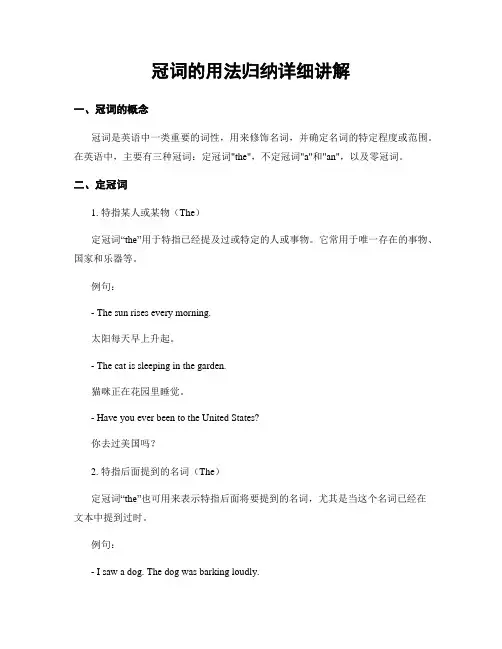
冠词的用法归纳详细讲解一、冠词的概念冠词是英语中一类重要的词性,用来修饰名词,并确定名词的特定程度或范围。
在英语中,主要有三种冠词:定冠词"the",不定冠词"a"和"an",以及零冠词。
二、定冠词1. 特指某人或某物(The)定冠词“the”用于特指已经提及过或特定的人或事物。
它常用于唯一存在的事物、国家和乐器等。
例句:- The sun rises every morning.太阳每天早上升起。
- The cat is sleeping in the garden.猫咪正在花园里睡觉。
- Have you ever been to the United States?你去过美国吗?2. 特指后面提到的名词(The)定冠词“the”也可用来表示特指后面将要提到的名词,尤其是当这个名词已经在文本中提到过时。
例句:- I saw a dog. The dog was barking loudly.我看到了一只狗。
那只狗正在大声吠叫。
3. 泛指整个类别(The)有时,“the”可以代表一个广义概念或抽象事物,表示整个类别。
例句:- The tiger is an endangered species.老虎是一种濒危动物。
- The Internet has changed the way we communicate.互联网改变了我们交流的方式。
三、不定冠词1. 泛指某个人或某件事(A / An)不定冠词“a”和“an”用于泛指一个人或一个事物,表示非特定或未提及过的事物。
例句:- I saw a cat on the roof.我在屋顶上看到一只猫。
- She wants to buy an apple.她想买一个苹果。
2. 不同音节开头的词使用规则(A / An)不定冠词“a”和“an”根据后面名词的发音来选择使用。
当该名词以辅音音素开头时,使用"a";当名词以元音音素开头时,使用'an'。
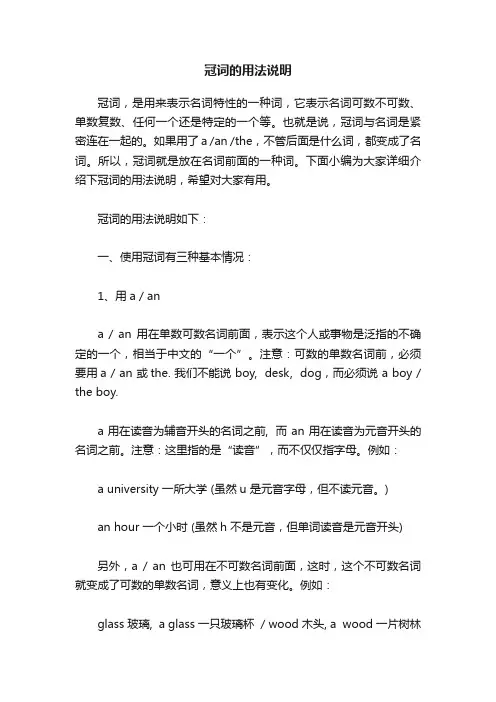
冠词的用法说明冠词,是用来表示名词特性的一种词,它表示名词可数不可数、单数复数、任何一个还是特定的一个等。
也就是说,冠词与名词是紧密连在一起的。
如果用了a /an /the,不管后面是什么词,都变成了名词。
所以,冠词就是放在名词前面的一种词。
下面小编为大家详细介绍下冠词的用法说明,希望对大家有用。
冠词的用法说明如下:一、使用冠词有三种基本情况:1、用a / ana / an 用在单数可数名词前面,表示这个人或事物是泛指的不确定的一个,相当于中文的“一个”。
注意:可数的单数名词前,必须要用a / an 或the. 我们不能说 boy, desk, dog,而必须说 a boy / the boy.a 用在读音为辅音开头的名词之前, 而 an 用在读音为元音开头的名词之前。
注意:这里指的是“读音”,而不仅仅指字母。
例如:a university 一所大学 (虽然u 是元音字母,但不读元音。
)an hour 一个小时 (虽然h 不是元音,但单词读音是元音开头)另外,a / an 也可用在不可数名词前面,这时,这个不可数名词就变成了可数的单数名词,意义上也有变化。
例如:glass 玻璃, a glass 一只玻璃杯 / wood 木头, a wood 一片树林power威力, a power大国 / beauty 美丽, a beauty美人, 美的事物2、用thethe 相当于this/that 或these / those,总的用法是表示特定的人或事物。
the 的用法最广,不管是可数还是不可数,不管是单数还是复数,都可以用the. 具体用法见下面的讲解。
3、不用冠词有的时候,名词前面不用任何冠词,没有a / an / the. 有的书上称为零冠词。
不可数名词前可以不用冠词,可数的复数名词也可以不用,还有一些习惯用法上不需要用。
下面,详细讲一个冠词的用法。
二、不定冠词的用法:1、表示某一类人或某事物中的任何一个, 通常在第一次提到某人或某物时用a / an,以表示与其他事物的区别。

冠词的英语语法讲解冠词的英语语法讲解(一)冠词概述冠词是限定词的一种,自己不能单独使用,只能依附于一个名词帮助说明这个名词的含义。
因此冠词也可以说是名词的一种标志,它不能离开名词而单独存在。
冠词有三种形式:不定冠词a(an),定冠词(the)和零冠词(即不使用冠词)。
冠词用法每次中考都会出现,主要考查:(1)名词前的定冠词、不定冠词和零冠词的用法;(2)固定搭配中的冠词用法。
a,an的用法区别是常考内容。
序数词前及形容词最高级前或姓氏前使用定冠词也是近年来中考的.常考内容。
(二)基础知识梳理1.不定冠词a/an的用法不定冠词用来修饰单数可数名词,指人或物中的某一个或某一类,但不具体说明是何人何物。
如:A famous astronaut will give us a talk the week after next.a用在以辅音音素(不是辅音字母)开头的单词前,如:a university student,a European country;an用在以元音音素(不是元音字母)开头的单词前,如:an honest girl,an underground train.现将不定冠词的基本用法归纳如下:1)首次提到某人某物,不定冠词起介绍作用。
如:Long long ago an old man lived in a small village.2)表示“每一”的意思,常用于表示时间、速度的名词之前,相当于every。
如:ten metres a second,twice a week3)也可用于不可数的物质名词和抽象名词之前,使其具体化。
如:1 would like a drink.It’s a great joy to live in Shanghai.4)某些固定短语中,要用不定冠词。
如:have a good time,ina hurry,have a break,for a while,a pair of,have a look,with a smile,take an active part in.2.定冠词the的用法1)指第二次提到的人或物。
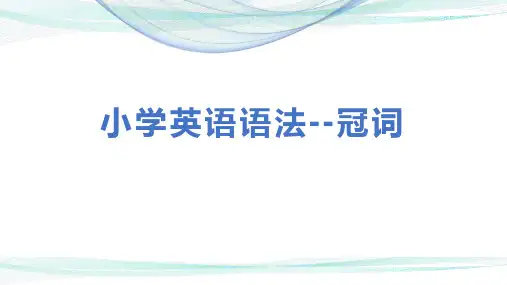
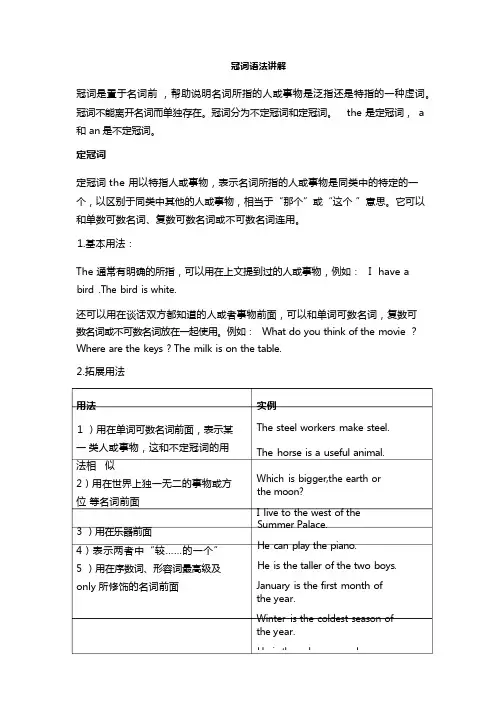
冠词语法讲解冠词是置于名词前,帮助说明名词所指的人或事物是泛指还是特指的一种虚词。
冠词不能离开名词而单独存在。
冠词分为不定冠词和定冠词。
the 是定冠词,a 和 an 是不定冠词。
定冠词定冠词 the 用以特指人或事物,表示名词所指的人或事物是同类中的特定的一个,以区别于同类中其他的人或事物,相当于“那个”或“这个”意思。
它可以和单数可数名词、复数可数名词或不可数名词连用。
1.基本用法:The 通常有明确的所指,可以用在上文提到过的人或事物,例如: I have a bird.The bird is white.还可以用在谈话双方都知道的人或者事物前面,可以和单词可数名词,复数可数名词或不可数名词放在一起使用。
例如: What do you think of the movie ?Where are the keys ? The milk is on the table.2.拓展用法用法1 )用在单词可数名词前面,表示某一类人或事物,这和不定冠词的用法相似2)用在世界上独一无二的事物或方位等名词前面3 )用在乐器前面4)表示两者中“较……的一个”5 )用在序数词、形容词最高级及only 所修饰的名词前面实例The steel workers make steel. The horse is a useful animal. Which is bigger,the earth or the moon?I live to the west of the Summer Palace.He can play the piano.He is the taller of the two boys. January is the first month of the year.Winter is the coldest season of the year.He is the only person who won必备词组( 1)与时间相关的短语 all the time 一直in the day 在白天 in the past 在过去 the next day 第二天 at the same time 同时 in the morning 在上午 the day before yesterday 前天in the 1990’s /1990s 在 20 世纪 90 年代 (2)与地点相关的短语at the foot of 在……的脚下in the front of 在……的前边 on the way to 在去 …… 的路上 in/on/to the east of 在…… 的东部 on the right / left 在右边/左边 in the sky 在空中7)用在由普通名词和另外一些词构成 的专有名词前面8 )表示“一家人”或“夫妇二人” 9)用在形容词或分词前表示一类人或 事物10 )用在固定结构“动词+ sb. +介词 the +某一部位”the Beijing Railway Station the People’s Republic of China the United states The Browns are kind to us. the rich , the poor ,the old ,the young, the disabled, the woundedMy teacher often pats me on the shoulder and encourages me to work hard.in the world 在世界上in/on the street 在街道上at the back of 在……的后边in the middle of在……的中间( 3 )其他固定短语make the bed 铺床on the whole 总之all the time 完全一样by the way 顺便问一下with the help of 在……的帮助下go to the cinema 去看电影不定冠词不定冠词有a 和 an 两种形式,用于单数名词前,表示微弱的“一”的概念,用来泛指事物,但并不强调数目。
冠词用法冠词是虚词,本身不能单独使用,也没有词义,它用在名词的前面,帮助指明名词的含义。
冠词可以说是名词的一种标志,它不能离开名词而独立存在。
表示的主语数量或者特征。
冠词分为不定冠词"a,an"、定冠词"the"和零冠词三种,零冠词指的是不用冠词的情况。
不定冠词表示泛指(适合大众的),定冠词表示特指(专有的,只有那一个)。
一、不定冠词用法不定冠词有"a和an"两种形式。
"a"用在以辅音开头的词前,"an"用在以元音开头的词前。
判断一个词是以元音开头还是以辅音开头,是根据读音而不是根据字母。
1. 用于可数名词的单数形式前,表示"一"There is a tiger in the zoo.2. 表示一类人和东西(句首表示泛指)A tiger can be dangerous.3. 表示"每一"的意思We go swimming four times a week.4. 用在作表语的单数可数名词前,表示身份、职业My mother is a teacher.二、定冠词用法1.特指某(些)人或某(些)物,这是定冠词的基本用法。
Beijing is the capital of China. (只是中国的,不是其他国家的)2.指谈话双方都知道的人或事物。
Open the window please.(只是大家知道的那个窗户,与其他的无关)3.指上文已经提到的人或事物。
(第一次提到用“a或an”,以后再次提到用“the”)There was a chair by the window. On the chair sat a young woman with a baby in her arms.4.指世界上独一无二的事物。
the sun 太阳the moon 月亮the earth 地球the sky 天空the world 世界5.用在序数词、形容词最高级前。
初中英语语法讲解—-冠词一、冠词的概念冠词是一个虚词,它置于名词之前,限定名词的意义.冠词可分为定冠词,不定冠词和零冠词三类.二、不定冠词:a/an1。
a用于辅音发音开头的词前,而不是辅音字母前面,如:a book,a desk;有些单词虽然是以元音字母开头,但需用a修饰,这些单词可以连成一句话:In a university, a European united a one-eyed man to steal a useful thing, then ran away along a one—way road. This is a usual thing。
在一所大学里,一个欧洲人联合独眼龙偷了一件有用的东西,然后沿着一条单行道逃跑了.这是一件平常的事。
2.an用于元音发音开头的词前,而不是元音字母前,如:an apple,an hour.有些单词虽然是以辅音字母开头,但发音却是以元音开头,这些单词可以连成一句话:An hour ago,an honest man accepted an honorable task.一个小时以前,一个诚实人接受了一项光荣的任务。
a/an的用法:1. a/an 用于单数可数名词前,表示“某一”“一…”或者“一个”的意思。
a book a boy a man a bird a dog an houran interesting book a big dog a dangerous animal2。
表示类别:这种用法是指某人或某物属于某一种类,或者指某一种类的人或物中的任何一个或一件,或者指某一种类的人或物,但不具体说明是何人或何物。
例如:That is a pen, not a pencil。
那是钢笔而不是铅笔。
(指属于某一种类)Give him a pear,please! 请给他一个梨。
(指某一种类中的任何一个)An elephant is bigger than a horse. 大象比马大。
如何正确使用英语中的冠词在英语中,冠词是一类非常重要的词性,包括定冠词(the)和不定冠词(a/an)。
掌握冠词的正确使用是提高英语语言能力的关键。
本文将从使用定冠词和不定冠词的场景、注意事项以及常见错误等方面进行探讨,帮助读者正确运用英语中的冠词。
一、使用定冠词(the)1. 特指某个已知事物或人:当我们提及某个特定的事物或人时,通常使用定冠词“the”。
例如:- I saw the car parked outside.- Have you seen the book I lent you?2. 特指独一无二的事物:当某个事物是唯一的,并且所有人都知道它的存在时,我们也可以使用定冠词“the”。
例如:- The sun rises in the east and sets in the west.- The Eiffel Tower is a famous landmark in Paris.3. 特指某类事物:当我们指的是某一类事物时,也可以使用定冠词“the”。
例如:- The tiger is an endangered species.- I love listening to the music.4. 特指事物的部分:当我们指的是事物的一部分时,同样使用定冠词“the”。
例如:- Can you pass me the salt?- I hurt my leg while playing football.二、使用不定冠词(a/an)1. 泛指一个事物或人:当我们提到一个不特定的事物或人时,通常使用不定冠词“a/an”。
例如:- I saw a car parked outside.- She is an engineer.2. 表示某种身份或职业:当我们使用某个身份或职业来形容某个人时,通常使用不定冠词“a/an”。
例如:- She wants to be a doctor when she grows up.- He is an excellent musician.3. 表示数量为一:当我们用英语表达数量为一时,通常使用不定冠词“a/an”。
英语冠词用法详解.doc英语冠词用法详解一、冠词的基本概念冠词,是用来表示名词特性的一种词,它表示名词可数不可数、单数复数、任何一个还是特定的一个等。
也就是说,冠词与名词是紧密连在一起的。
如果用了a /an /the,不管后面是什么词,都变成了名词。
所以,冠词就是放在名词前面的一种词。
使用冠词有三种基本情况:1、用a / ana / an 用在单数可数名词前面,表示这个人或事物是泛指的不确定的一个,相当于中文的“一个”。
注意:可数的单数名词前,必须要用a / an 或the. 我们不能说 boy, desk, dog,而必须说 a boy / the boy.a 用在读音为辅音开头的名词之前, 而 an 用在读音为元音开头的名词之前。
注意:这里指的是“读音”,而不仅仅指字母。
例如: a university 一所大学 (虽然u 是元音字母,但不读元音。
)an hour 一个小时 (虽然h 不是元音,但单词读音是元音开头)另外,a / an 也可用在不可数名词前面,这时,这个不可数名词就变成了可数的单数名词,意义上也有变化。
例如: glass 玻璃, a glass 一只玻璃杯 / wood 木头, a wood 一片树林power威力, a power大国 / beauty 美丽, a beauty美人, 美的事物2、用thethe 相当于this/that 或these / those,总的用法是表示特定的人或事物。
the 的用法最广,不管是可数还是不可数,不管是单数还是复数,都可以用the. 具体用法见下面的讲解。
3、不用冠词有的时候,名词前面不用任何冠词,没有a / an / the. 有的书上称为零冠词。
不可数名词前可以不用冠词,可数的复数名词也可以不用,还有一些习惯用法上不需要用。
下面,详细讲一个冠词的用法。
二、不定冠词的用法:1、表示某一类人或某事物中的任何一个, 通常在第一次提到某人或某物时用a / an,以表示与其他事物的区别。
冠词的用法——冠词的定义冠词,是用来表示名词特性的一种词,它表示名词可数不可数、单数复数、任何一个还是特定的一个等。
也就是说,冠词与名词是紧密连在一起的。
如果用了a /an /the,不管后面是什么词,都变成了名词。
所以,冠词就是放在名词前面的一种词。
使用冠词有三种基本情况:1、用a / ana / an 用在单数可数名词前面,表示这个人或事物是泛指的不确定的一个,相当于中文的“一个”。
注意:可数的单数名词前,必须要用a / an 或the. 我们不能说boy, desk, dog,而必须说a boy / the boy.a 用在读音为辅音开头的名词之前, 而an 用在读音为元音开头的名词之前。
注意:这里指的是“读音”,而不仅仅指字母。
例如:a university 一所大学(虽然u 是元音字母,但不读元音。
)an hour 一个小时(虽然h 不是元音,但单词读音是元音开头)另外,a / an 也可用在不可数名词前面,这时,这个不可数名词就变成了可数的单数名词,意义上也有变化。
例如:glass 玻璃, a glass 一只玻璃杯 / wood 木头, a wood 一片树林power威力, a power大国/ beauty 美丽, a beauty美人, 美的事物2、用thethe 相当于this/that 或these / those,总的用法是表示特定的人或事物。
the 的用法最广,不管是可数还是不可数,不管是单数还是复数,都可以用the. 具体用法见下面的讲解。
3、不用冠词有的时候,名词前面不用任何冠词,没有a / an / the. 有的书上称为零冠词。
不可数名词前可以不用冠词,可数的复数名词也可以不用,还有一些习惯用法上不需要用。
下面,详细讲一个冠词的用法。
冠词的用法——不定冠词的用法1、表示某一类人或某事物中的任何一个, 通常在第一次提到某人或某物时用a / an,以表示与其他事物的区别。
冠词用法讲解冠词作为一种虚词,在英语中只能和名词一起使用。
英语中的冠词分为不定冠词和定冠词。
1.不定冠词的用法不定冠词有两个,a 和 an。
a用在辅音开头的单词前面;an用于以元音开头的单词前。
如:a book, an apple。
1)不定冠词用在单数可数名词前表示“某一个”。
如:There is a policeman at the door.门口有个警察。
2) 不定冠词用在单数可数名词之前,表示“任何,每个”。
如:A car must be insured.汽车一定要上保险。
3) 不定冠词用于头一次出现的单数名词之前。
如:There is a box in the room. The box is heavy.房间里有个箱子。
这个箱子很重。
4) 不定冠词和名词连用作表语或同位语,主要说明某个人或东西所属类别。
如:She is a teacher. 她是个老师。
5)定冠词用在价格、速度、比率等短语中。
如:six kilometers an hour 每小时60公里3 times a day 每天三次6) 不定冠词用在专有名词前。
如:He wants to buy a Kodak.他想买架柯达相机。
7)不定冠词用于某些固定短语中。
如:have a try试一下 take a break 休息一下 have a good time 玩得痛快make a living 谋生 as a matter of fact 事实上 in a word 总而言之2. 定冠词(the)的用法1)定冠词和名词连用,表示某个或某些特定的人或东西。
如:Mother carved the meat into slices妈妈把肉切成了片。
2)定冠词用于可数名词前,表示一类人或东西。
如:The horse is a useful animal. 马是一种有用的动物。
3)定冠词用于第二次出现的名词之前。
如:I got a letter yesterday. The letter was sent by e-mail.我昨天接到了一封信。
那信是电子邮件。
4)定冠词用于有词组或者定语从句修饰的名词前。
如:He is investigating the cause of the fire.他正在调查这场大火的原因。
5)定冠词用于某些名词或者形容词前,表示一类人,一个民族,阶级或阶层。
如:the chinese 中国人 the rich 富人the dead 死者 the deaf 聋人6)定冠词用于指说话双方都知道的人或事。
如:Please close the door.请把门关上。
7)定冠词用于世界上独一无二的事物前。
如:the sun 太阳 the earth 地球 the world世界8)定冠词用于序数词前表示顺序。
如: the third group 第三组9)定冠词用于形容词和副词的最高级前面。
如:This is the most intersting book I have ever read. 这是我所读过的书中最有趣的一本。
10)定冠词在play后和乐器连用如: play the piano弹钢琴 play the flute 吹长笛11)定冠词与姓氏的复数形式连用,表示一家人。
如:The Blacks came to China in 1994. 布莱克一家是1994年来中国的。
12)定冠词的其他用法the Changjiang River长江 the Red Sea 红海(用于表示江河海洋的名词前)the Taiwan Straits台湾海峡 the Gulf of Mexico墨西哥湾(用于表示海峡海湾的名词前)the Alps阿尔卑斯山 the Sahara Desert撒哈拉沙漠(用于山脉沙漠的名词前)the People’s Republic of China 中华人民共和国(用于国家名称)the National Gallery国家美术馆 the Military Museum 军事博物馆(用于公共建筑名前)the State Council国务院 the Senate参议院 the House of Representatives 众议院(用于机关、团体名词前)the Geneva Agreement日内瓦协议 the Washington Post 华盛顿邮报 (用于报刊、条约之前)3.不用冠词的情况1)表示独一无二的职务、身份前一般不用冠词。
如:Elizabeth II, Queen of England 英国女王伊丽莎白二世He was elected chairmen of the committee.他当选为协会主席。
2)表示球类、棋类的运动项目不加冠词。
如: play football 踢足球 play chess下象棋3)在一日三餐名词前不用冠词。
如: have breakfast/lunch/supper 吃早饭/午饭/晚饭4)交通工具名词前不用冠词如:by car坐汽车 by ship 坐船by plane坐飞机on foot 步行5)在一些地点的名词,如:bed, church, school, hospital,home, work等。
当人们去这些地方做在这些地方应该做的事时,不加冠词。
go home回家 go to school去上学 go to church去教堂祈祷in hospital住院 go to work上班注:如果在上述词组前面加上定冠词the,可以表示去这些场所做其他的事情。
如:He came to the school to speak to the headmaster.他来学校和校长谈话。
He went to the church to see the carvings.他去教堂看雕刻。
His mother is in hospital and he has been in the hospital to take care of her.他妈妈生病住院了,他就一直在医院里面照顾她。
4.泛指概念的四种表达方式1)不带the 的不可数名词可以表示泛指I like music.我喜欢音乐。
2)不带the 的复数可数名词表示泛指。
Bananas are yellow.香蕉是黄色的。
3)“the+单数可数名词”可以表示泛指The elephant is the largest land mammal.大象是陆地上最大的哺乳动物。
4)“不定冠词a/an+单数可数名词”可以表示泛指。
A dog makes good pet.狗是很好的宠物。
冠词练习题:1. Tomorrow is ______ Teachers' Day and we'll make ______ card for our English teacher.2. The bus is running about seventy miles_____ hour.3. Mary is interested in ______ science.4. Some people don't like to talk at ______ table.5. Last night I went to______ bed very late.6. Don't worry. We still have ______ little time left.7. What ______ beautiful day! And what ______ fine weather!8. In ______ winter it is cold in ______ Beijing and warm in ________Shanghai.9. John is______ cleverest boy in his class.10. We can't live without ______ water or ______ air.11. Tomorrow Mr. Smith will leave Paris, ______capital of______ France, for Washington by______ air.12. We were having______ lunch when they came in.13. This is ______ book you gave me last week.14. What did you do ______ last Saturday15. March 8 is ______ Women's Day.16. If ______ weather is fine tomorrow, we will go to the park.17. I prefer playing ______ piano to playing ______ basketball.18. At ______ age of five, he read a lot of books.19. Tom and Lucy are of ______ same age.20. ______ harder we study, ______ more we learn.冠词答案:1. ×; a 3. × 4. × 5. × 6. a ; × 8. ×; ×; × 10.×; × 11. the; ×; × 12. × 14.× 15. × ; × 20. The; the1. When Linda was a child, her mother always let her have ______ bed.A. the breakfast in B. the breakfast in the C. breakfast inD. breakfast in the2. Beyond ______ stars the astronaut saw nothing but ______ space.A. the,不填 B.不填,the C.不填,不填 D. the, the3. Alexander Graham Bell invented ________ telephone in 1876.A.不填 B. a C. the D. one4. After watching ____ TV, she played _____ violin for an hour.A.不填,不填B. the, the C. the,不填D.不填,the5. Many people are still in ____ habit of writing silly things in ____ public places.A. the, the B.不填,不填C. the,不填 D.不填,the6. Paper money was in ____ use in China when Marco Polo visited the country in ____ thirteenth century.A. the,不填B. the, the C.不填,the D.不填,不填7. Have you seen ______ pen I left it here this morning.Is it ____ black one I think I saw it somewhere.A. a, the B. the, the C. the, a D. a, a8. She is _____ newcomer to ____ chemistry but she has already made some important discoveries.A. the, the B. the,不填 C. a,不填 D. a, the9. Many people agree that ___ knowledge of English is a must in ____ international trade today.A. a,不填B. the, an C. the, the D.不填,the10. ______ usually go to church every Sunday.A. The Brown B. A Brown C. Browns D. The Browns11. The train is running fifty miles ______.A. an hour B. one hour C. the hour D. a hour12. ___ earth we live on is bigger than___ moon.A. The, a B. The, the C. An, a D. An, the13.— What’s the matter with you—I caught ___ bad cold and had to stay in ___bed.A. a, / B. a, the C. a, a D. the, the14.—Do you know ___ lady in blue—Yes. She is a teacher of a university.A. the B. a C. an D. /15.—Where’s ___ nearest supermarket—It’s over there, just around the corner.A. a B. an C. the D. /16. The young man will work in ___ school as a maths teacher.A. the B. a C. an D. /17. Most of the representatives think that ______ the meeting was very successful.A. on whole of B. on a whole C. on the whole D. on the whole that18. The investigators found that more should be done for ______ in India.A. those poor B. a poor C. poor D. the poor19. He grabbed me ______ and pulled me onto the bus.A. a arm B. an arm C. the arm D. by the arm20.“How did you pay the workers”“As a rule, they are paid ______.”A. by an your B. by the hour C. by a hour D. by hours21. What _____ exciting football match! Our team beat Tom’s team at last.A. a B. an C. the D. /22. In the United States, Father’s Day falls on _____ third Sunday in _____ June.A. the,不填 B. the, a C.不填, the D. a,不填23. I have two dogs. ______ black one is two years old and ______ yellow one is three years old.A. A, a B. The, a C. The, the D. A. the24. ______ new bridge has been built over ______ Huangpu River.A. The, a B. A, / C. A, the D. An, an25.-What colour is ______ orange-It’s _____ orange.A. an, an B. an, the C. an, / D. /, an答案与解析(部分)1. C 2. A。